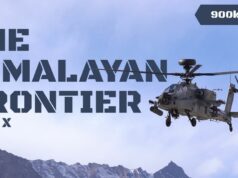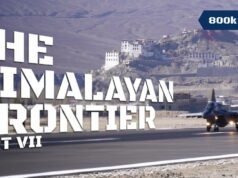A lot of lessons from the Ukraine, Gaza wars, and the Ladakh standoff with China. In an exclusive interview with Editor-in-Chief Nitin A. Gokhale, Air Chief Marshal V.R. Chaudhuri, the Chief of Air Staff (CAS) dwells on lessons learned from the Russia-Ukraine war, the changing nature of war, and why the Indian Air Force will always be the first offensive choice in any conflict. Conflicts and wars hold out invaluable lessons not only for those who are actively involved but also for those watching them from outside. The ongoing Russia-Ukraine war has spilled into the third year and the Israel-Hamas war in Gaza shows no signs of ending. Add to that the standoff between Indian and Chinese troops along the Line of Actual Control in Eastern Ladakh, which will be four years old. In this interview with Nitin A. Gokhale in Jaisalmer, the Air Chief lists the key takeaways from the conflict in the Himalayan frontier and wars in distant lands. Discussing the recently held firepower demonstration Exercise Vayushakti 2024, the CAS says that exercises at such massive scales are undertaken only once in a few years. The exercise being wide in scope allows the coordinated employment of all IAF resources, including fighter, transport, and rotary wing assets, all kinds of ammunition, ISR resources, radars, etc. Talking about lessons drawn from the standoff with China in Eastern Ladakh, the CAS highlighted leadership, ability to adapt, and training among other factors that the IAF has inculcated. The Ladakh experience has also boosted jointness. According to the CAS, common platforms, and common systems will have common maintenance. Complete interoperability between the Army and the IAF.
Watch this Exclusive interview in our series the Himalayan frontier. Part VIII.
You can watch the entire interview on our sister channel BharatShakti.
The Himalayan Frontier: documenting the China and Pakistan two-front threat.
A series of ground reports and interviews with the Chiefs of the Army Staff, Air Force, and Border Roads Organisations (BRO) on all three military service operations in Eastern Ladakh and Siachen. Only on StratNews Global. Our Founder and Editor-in-Chief, Nitin Gokhale interviews General Manoj Pande, the Chief of the Army Staff, Air Chief Marshal V.R. Chaudhari, the Chief of the Air Staff, Indian Air Force (IAF), and Lt General Upendra Dwivedi, the then Northern Army Commander, who took over as Vice Chief of Army Staff in February 2024. A StratNews team of Amitabh P. Revi, Rohit Pandita, and Karan Marwaha also travels during the fourth winter of India’s forward deployment post-Xi Jinping’s aggression that led to the deadly Galwan clashes in 2020 to get you a series of ground reports on a crucial road link to Leh-a third axis, the Nimu-Padam-Darcha(NPD) road, an exclusive interview with Lt Gen Raghu Srinivasan, the Director General of the Border Roads Organisation, film at the IAF, Air Force Station Leh, interview the Air Officer Commanding, Air Commodore D.S. Handa, report from Siachen and other places in Eastern Ladakh in this The Himalayan Frontier series.
Northern Front Ground Reports
In earlier episodes of The Himalayan Frontier series, in Part VI, we interview Air Commodore D.S.Handa, AOC of the Indian Air Force’s AFS, Leh on how the IAF is dealing with the two-front China and Pakistan threat in Ladakh. SNG’s team documents its journey to Leh on the strategic third, alternate axis—the Darcha-Padam-Nimu (NPD) Road, in episode III and episode IV. The route provides critical connectivity. In episode V, Lt Gen Raghu Srinivasan, the DG, BRO in an interview on the frozen Zanskar River Chadar Trail at Chiling near Leh in Ladakh notes “The impetus for connectivity has over the last five or six years been a surge in what we are planning to do and are doing in Ladakh”. In part II of this series, the Indian Army Chief, General Manoj Pande tells StratNews Global Editor-in-Chief Nitin A. Gokhale in an exclusive interview, that talks with China are continuing at both military and diplomatic levels but India is maintaining a robust posture along the LAC. Then Northern Army Commander, now Vice Chief of the Army Staff, Lt Gen. Upendra Dwivedi also tells Nitin Gokhale in Part I, that the “situation is stable but sensitive and not normal”.
#india #iaf #indianairforce #vayushakti2024 #pokhran
Nitin A. Gokhale is a media entrepreneur, one of South Asia's leading strategic affairs analyst and author of over a dozen books so far on military history, insurgencies and wars.
Starting his career in journalism in 1983, he has since led teams of journalists across media platforms.
A specialist in conflict coverage, Gokhale has covered the insurgencies in India’s North-East, the 1999 Kargil conflict and Sri Lanka’s Eelam War IV between 2006-2009.
Gokhale now travels across the globe to speak at seminars and conferences, and lecture at India’s premier defence colleges. He has founded three niche portals, Bharatshakti.in, stratnewsglobal.com and Interstellar.news.




